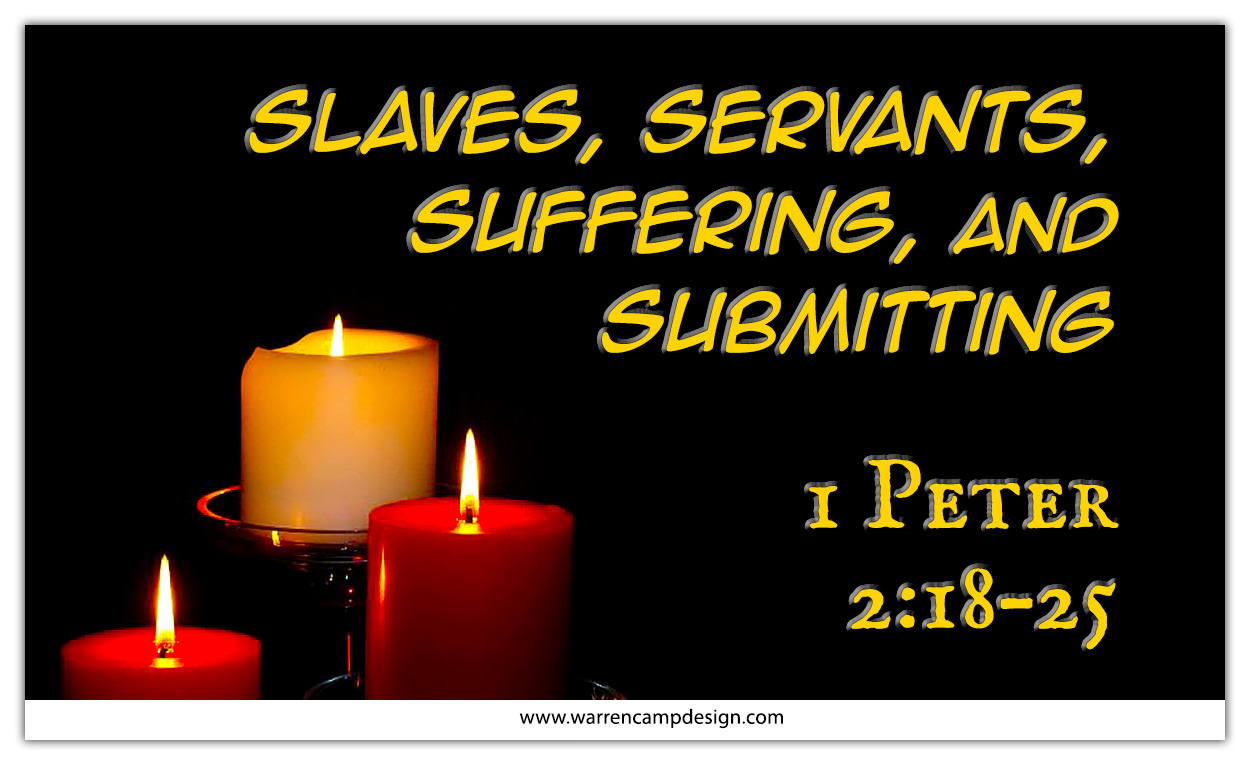
by Warren Camp
1 Peter 2:18–25 . . .
“God-Fearing Slaves Are to Submit to Their Masters”
After reading the title of today’s passage, you might understandably feel, Because I’m not a slave, Peter’s text certainly doesn’t apply to me. And, you’ll probably feel comfortable, after reading vv. 18–25, knowing that Peter wrote this text thousands of years ago to a slave class of people that no longer exists. If this is how you feel, watch out! This study lesson is definitely meant for you!
Peter’s words in today’s text, addressed to slaves, are applicable to every Christian. Read all eight verses of both divisions now. Now that you’ve read today’s passage, Pastor/teacher Bob Deffinbaugh will suggest why this “slaves” passage is addressed to all believers.
“First, the term Peter uses in our text is not restricted to slaves; nor is this the usual word for slaves. Rather, it’s a much less common word that might refer to a broader group. Thus, not only slaves but servants are addressed. [While the NIV uses the word “Slaves,” the majority of versions use the word “Servants.”]
“Second, many may technically not be slaves but are subject to people with virtually unquestioned authority, thus facing a condition similar to that of a slave. For instance, (a) an armed forces private has a sergeant who’s the master, (b) a prison inmate, or (c) one living in a ghetto who, because of his/her poverty or minority status, believes he/she has virtually no rights.
“Third, Peter speaks more generally in v. 19 as he lays down a broad principle that applies to all believers.
“Fourth, our Lord and His apostles consistently taught that every Christian is Christ’s slave (Mark 9:35; 10:44; Romans 1:1; 6:12–23).
“Fifth, Peter is instructing the Christian about submission to authority in the context of suffering for the sake of godly conduct. His teaching about slaves and masters is a “worst case scenario.” If Peter’s teaching applies here, as it does, surely it applies in less difficult circumstances as well.
“Sixth, no time in history had there been such abuse as in Peter’s days. Suffering is the dominant theme of his first epistle; no one is likely to be more abused than the Christian slave who was subject to every whim of his master, who had absolute authority over him. Peter doesn’t allow the fact that a slave may be abused to become an excuse for sin. Rather, he instructs us to use it as an opportunity to imitate our Lord and Savior, Jesus Christ.
“The first division (vv. 18–20) focuses on Christian servants who are called to suffer for Christ’s sake. The second (vv. 21–25) has Peter turning to the Old Testament prophecy concerning the Lord Jesus as the Suffering Servant who provides the motivation, means, and model for all suffering servants.”[1]
It’s Commendable If Someone Endures Painful Suffering (2:18–20)
One of the hardest situations to bear is unjust suffering. We can expect to reap pain and trouble if we sow sin, but what if we haven’t done anything wrong? Even trials that seem to come for no reason are easier to bear than those resulting from someone’s mistreatment of us. This is what Peter had in mind when he wrote this passage. Slaves in the Roman Empire had few rights if any, and abuse wasn’t uncommon. Becoming a Christian didn’t change the circumstances, but it did require a different response. Peter told them to respectfully submit to their masters and endure mistreatment because such a response finds favor with God.
After commanding all Christians to submit to every human authority, including emperors, kings, and governors (as highlighted in Warren’s previous commentary on 2:11–17), Peter now specifically says the same thing to Christian servants (or slaves) about their masters. The word used here is not the Greek douli, the classic term for “slaves.” Rather, it’s oiketai, probably best translated as household servants. That said, the line between servants and slaves was blurry in Peter’s time. Slavery had little to do with race, as modern readers often process the idea, and more to do with economics and social class.
Servants in those days generally were slaves who had heathen masters who often abused them cruelly. The command to submit to masters wasn’t just to those who work for good and gentle masters but also “those who are harsh.”
18Slaves, in reverent fear of God submit yourselves to your masters, not only to those who are good and considerate, but also to those who are harsh. 19For it is commendable if someone bears up under the pain of unjust suffering because they are conscious of God. 20But how is it to your credit if you receive a beating for doing wrong and endure it? But if you suffer for doing good and you endure it, this is commendable before God (1 Pet. 2:18–20 NIV).
Peter had written this first letter to Christian slaves who’d been touched by God’s sovereign grace, redeemed by Christ’s blood, and called and regenerated by the Holy Spirit. Having converted to Christ, they were now his bondslaves, internally set free from the bondage of sin and Satan. However, they were still slaves who submitted externally to Roman masters. The command to slaves was, “Be submissive!” They were to submit to human masters, even when they felt that their masters were wrong (unless their orders conflicted with Scripture). They were never to lie, steal, cheat, murder, or do anything that would disobey the moral law of God in order to please their masters. They were to submit out of fear of God, not of men.
Christian slaves weren’t to submit only to the benevolent masters; that would amount to compliance or assent. Instead, they were also to obey the unreasonable, crooked, perverse, unfair, and cruel masters; that’s true submission. Such a submittal pleases God. (See Ephesians 6:5–6; Colossians 3:22–25)
Peter next tells these Christians in v. 19 that it’s commendable to endure unjust suffering “because they are conscious of God.” Literally translated: “For it brings favor if, being mindful of God’s will, someone endures grief after suffering unjustly.” The idea is that God will bestow grace on people who suffer willingly for God’s sake. People so honored can anticipate receiving “an inheritance that can never perish, spoil or fade… kept in heaven for you” (1:4).
Specifically, we should be willing to obey those in authority even if they mistreat us. Peter shows throughout the context of this letter, we should not only obey those who have authority over us, we should obey them even when they mistreat us. This may cause suffering, just as Christ suffered; yet we must endure as he did. We please God when we do right and then suffer.
Be Faithful and Submissive Even When Mistreated (vv. 21–25)
Jesus called us to do right, even when it’s not easy and when we’re mistreated. He gave us this example: He suffered for our sakes even though he didn’t deserve to suffer. He didn’t harm those who caused him to suffer, though he could have done so. Yet he bore this mistreatment patiently. Peter illustrates the point that he’s been making throughout this chapter: We should be faithful and submissive even when mistreated.
21To this you were called, because Christ suffered for you, leaving you an example, that you should follow in his steps. 22“He committed no sin, and no deceit was found in his mouth.” 23When they hurled their insults at him, he did not retaliate; when he suffered, he made no threats. Instead, he entrusted himself to him who judges justly. 24“He himself bore our sins” in his body on the cross, so that we might die to sins and live for righteousness; “by his wounds you have been healed.” 25For “you were like sheep going astray,” but now you have returned to the Shepherd and Overseer of your souls (1 Pet. 2:21–25).
Jesus would have been prominent in Peter’s mind when he wrote vv. 22–23, because Peter personally witnessed Jesus’ pain — though from afar. Jesus is the perfect model of how we’re to respond to unjust treatment because he endured far worse treatment than any person who will ever live, yet he never sinned. And in v. 24, when Apostle Peter said that Christ “bore” our sins, he used a term that means “to carry a massive, heavy weight.” That’s what sin is. Only Jesus can remove such a weight from us. When Christ “bore our sins,” he endured physical and spiritual death to pay our sin debt.
In these five verses, there are no less than six references to Christ as the Suffering Servant (as depicted in Isaiah 53). Christ suffered vicariously for all people. It’s incumbent upon his followers that we shouldn’t withdraw from a specific duty if we might incur suffering as a result. Realize, too, that, just as slaves were obligated to obey their masters, so Christians are obligated to obey our master, Father God, in our relationship with Christ Jesus. The word “example” in v. 21 (Greek, hupogrammos, meaning a written copy, a pattern for a copybook) is very similar to a word translated as “pattern” in Hebrews 8:5. The concept becomes a precious representation of Christian behavior and lifestyle.
Jesus is the perfect Example of how we must behave in all situations. Although he was blasphemed, reviled, and cursed, he never fought back or allowed himself to be dragged into a war of words. For this reason, Peter exhorts us today to follow in Jesus’ steps (vv. 21–22).
Rick Renner reveals (in Sparkling Gems from the Greek) that “in v. 24, Peter quoted Isaiah 53:5. He told his readers, ‘by his stripes we are healed.’ The word ‘stripes’ used in this verse is the Greek molopsi, which describes a full-body bruise. It refers to a terrible lashing that draws blood and produces discoloration and swelling of the entire body. When Peter wrote this famous verse, he wasn’t speaking by revelation but by memory, for he had vividly remembered what happened to his Lord Jesus that night and what his physical appearance looked like after his horrific scourging. After graphically reminding us of the beating, bleeding, and bruising that Jesus fully endured, Peter jubilantly declared in this verse that it was by these same stripes that we are ‘healed.’ The Greek word iaomai clearly refers to physical healing, as it’s a word borrowed from the medical term to describe the physical healing or curing of the human body.
“For those who think this promise refers only to spiritual healing, that Greek word emphatically speaks of the healing of a physical condition. This is a real promise of bodily healing that belongs to all who’ve been washed in the blood of Jesus Christ! Jesus’ broken body was the payment God demanded to guarantee our physical healing. Just as Jesus willfully took our sins and died on the cross in our place, he also willfully took our sicknesses and pains on himself when they tied him to the scourging post and laid those lashes across his body. That horrific scourging paid for our healing.”
Concluding Considerations from Dr. Charles Stanley
Scripture tells us that obedience brings blessing. But from a human perspective, it sometimes seems that the only result obedience brings is trouble. Peter uses the example of a servant who submits to an unreasonable master but is treated unjustly and suffers as a result of doing what’s right.
There are basically two ways to respond to such unfair treatment. We can grumble, complain, and seek vengeance, or we can patiently endure it. The latter is the only response that finds favor with God. Why? Because when we act this way, we’re following in Christ’s footsteps.
No one was treated more unfairly than Jesus. He never did wrong, yet he was reviled, mocked, tortured, and killed by men. However, he didn’t revile in return or utter threats. Instead, he entrusted himself to his Father.
Having this kind of attitude may seem impossible, and it is — apart from God’s power. But Jesus bore our transgressions on the cross so we might die to sin and then live righteously. He’s given us all we need to respond in a manner that pleases our heavenly Father. Every difficult, unjust, and painful situation is an opportunity to entrust ourselves to God, who judges righteously. Then, through the Holy Spirit, we’ll be empowered to respond in a Christlike manner, which God looks upon with favor.
- Q. 1 In relation to suffering, what is your reaction to what v. 21 says?
- Q. 2 How can Christ’s example (vv. 21–23) help you when you’re mistreated?
- Q. 3 Beyond his example, what benefits has Christ’s suffering produced (vv. 24–25)?

‘The Arrest of Christ’
Click to open “Peter Masterpieces.”
Summary Video: “First Peter”
† Watch this overview video of First Peter created by BibleProject.
Warren’s New “Peter Masterpieces” Photo Album
† View several classic paintings of Saint Peter by art world masters: Rembrandt, Michelangelo, Da Vinci, Rubens, Goya, El Greco, Raphael, Masaccio, Giotto, Correggio, Tintoretto, Caravaggio, Veneziano, Tissot, Duccio, Fra Angelico, Galle, Dürer, Palomino, and many more.
1 Peter 2:18–25
New International Version (NIV) or view it in a different version by clicking here.
— Listen to chapter 2, narrated by Max McLean.





